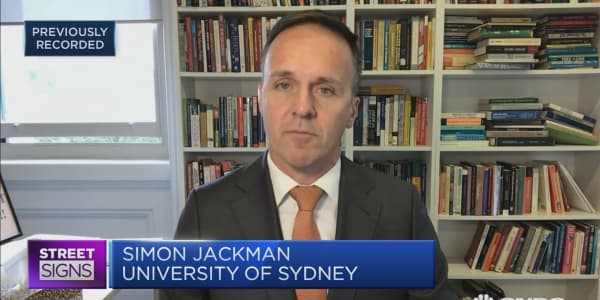As a candidate, Donald Trump called global climate change a hoax, said he wanted to throw out international climate agreements and put fossil fuels at the center of his energy agenda.
Though President-elect Trump stepped back from some of his more fiery rhetoric on environmental issues this week, uncertainty remains among investors.
The PowerShares WilderHill Clean Energy Portfolio ETF, which counts Tesla as its top holding, dropped the day after the election, but has since recovered all that loss and then some. The Guggenheim Solar ETF is off more than 6 percent since the election, but has rebounded from its November low.
Some analysts caution that it is too early to assume renewables are under a great political threat. The picture is more nuanced, even if some market reactions have appeared broad-based and harsh.
Trump's rhetoric and campaign promises have suggested this administration will be less supportive of regulating emissions and of investing in renewable energy than the Obama administration. And many of Obama's executive orders on environmental issues could be rewritten or tossed entirely. Indeed, Trump's campaign promised to "rescind all job-destroying Obama executive actions" in the service of the country's energy goals.
But as president-elect, Trump appears to have moderated some of his opinions. In an interview Tuesday, with The New York Times, he refused to repeat his promise to abandon the international climate accord reached in Paris last year and said he would keep an open mind about climate change.
While scrapping carbon-reduction laws could shrink long-term growth opportunities for renewable energy, analysts say that existing policies directly affecting actual renewable energy companies, such as tax credits, do not appear to be under the same pressure.
"Energy was a lower-priority sector for the Trump campaign, and clawback of the tax credits for wind and solar has never been a part of the Trump platform," FBR analyst Benjamin Salisbury wrote in a research note last week. "According to our conversations, renewables are an unlikely target, and a great deal of focus and political capital will be taken up by other agenda items."
Clean Power Plan
Some analysts have hinted that the Trump administration has a decent chance of rewriting, or simply scrapping, the Clean Power Plan developed by the Environmental Protection Agency under the Obama administration to require power plants to cap carbon emissions.
The Obama administration developed the plan after Congress scrapped a cap-and-trade program to control greenhouse-destroying gas emissions. Ever since, there have been legal challenges to the plan, with one battle already underway in the U.S. Court of Appeals for the District of Columbia Circuit.
Proponents of the Clean Power Plan say that doing away with it would almost certainly keep the U.S. from meeting emissions targets set during the 2015 Paris Climate Agreement, from which Trump pledged to withdraw from during his campaign.
The Paris Accord was agreed to by almost 200 countries, and many have said doing away with the Clean Power Plan or the Paris Agreement could have global political and environmental ramifications, such as spurring other countries to roll back their commitments. This could lead to slowdowns in demand for solar and wind energy power elsewhere in the world.
This week, Trump chose not to restate his commitment to withdrawing the U.S. from the agreement, simply saying he is "looking at it very closely."
In addition, the Clean Power Plan in particular offered opportunities for states to meet emissions targets by investing in renewable energy, so scrapping the plan will remove some opportunities for growth among renewable energy and energy efficiency companies.
"For U.S. renewable power companies, risks to existing policies are overblown, but the EPA's Clean Power Plan will not be implemented nationwide, likely slowing the long-term growth curve," Raymond James analyst J. Marshall Adkins said in a research note last week.
Renewable energy tax-credits
Still, investor confidence in the wind and solar power sector is also being held back by concerns over the future of the Investment Tax Credit for solar power and the Production Tax Credit for wind, analysts said.
These credits are the "life blood of the renewable sector," UBS analyst Julien Dumoulin-Smith said in a recent research note. A government hostile to the credits could change criteria for who is eligible to receive them, or repeal them outright, he said.
But several analysts, including Dumoulin-Smith, aren't expecting major changes here.
"At the outset, let's underscore the fact that the vast majority of federal policies affecting various clean tech verticals are 'on autopilot' rather than changing wildly under different administrations," Raymond James analyst Pavel Molchanov said in a recent note. "Furthermore, most of these policies are bipartisan and non-controversial in nature. Thus, there is no objective basis for concluding that the Trump administration will be actively hostile."
FBR's Salisbury said the Trump campaign and his agenda have "targeted President Obama's executive actions on climate without opposing tax cuts. As a candidate, the president-elect supported the wind credit that phases out and took no position against the solar credit."
GOP's complex relationship with renewables
Also, Republicans have a more complex relationship with renewable energy than some headlines might suggest, Salisbury said. Republican senators represent about half of all the top wind energy states, and nearly half of the top solar states.
"So although the party has strong ties to the fossil fuel sectors and has tended to resist aggressive environmental regulation, it has also supported renewable tax cuts," Salisbury said. "Given the bipartisan support for the credits, narrow Senate majority, power of the filibuster, and long list of competing priorities, we see a very low possibility for the tax credits to be repealed on their own."
There also are various state tax credits and the Renewable Portfolio Standards — laws requiring a certain portion of a state's power generation mix to come from renewable sources — to consider. Most states have some such standards, but details vary, and those could also change.
At risk also is the $7,500 federal tax credit for electric vehicle purchases. However, the effect this will have on companies is less clear. Certainly tax credits can be effective tools to lure customers, but how much they matter is open for debate.
Also, Tesla is set to sell its 200,000th car sometime next year — a hurdle that means its cars will no longer be eligible for the full credit anyway.
Other major auto manufacturers have made much smaller bets on electric cars so far.





